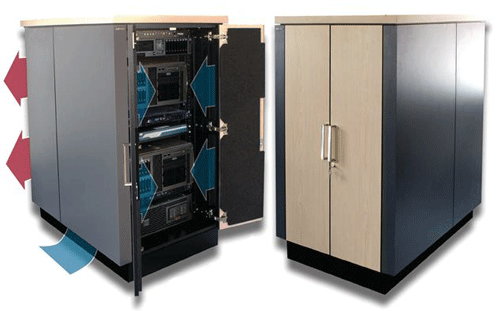
According
to management consultancy Accenture, the energy
expenditure required to cool servers is as much as
the energy required to power the servers themselves,
pushing up company cooling budgets, and in turn
carbon emissions.
One
solution to this problem is to ditch the traditional
computer room, and to house servers, and other
network infrastructure, in cabinets. Server cabinets
developed by Kell Systems use forced-air cooling to
keep temperatures under control, and to ensure that
noise levels are low enough for the cabinets to be
usable in the open office, thus removing the need
for dedicated air-conditioned server room facilities
In
a typical usage case, Kellís cabinets reduce
perceived server noise by up to 90 per cent, CO2
emissions by 96.5 per cent, floor space by 90 per
cent, operating costs by 98 per cent, and capital
costs by 65-80 per cent, when compared to a
conventional server room (based on typical office
with servers, switches, patching, UPS, KVM and tape
backup).
If
a typical 3.6 kW server room installation were
replaced with an equivalent Kell ComputerVault Pro
cabinet deployed in the open office, hardware
cooling costs can be reduced by £1,300 per annum
(calculation based on a conservative price of 10p
per kW/hour).
Whilst
server manufacturers are bringing out new energy
efficient models, unless introduced alongside a
strategy that can reduce the cost of cooling them,
only a fraction of the potential energy cost savings
can be achieved. Server cabinets enable companies to
meet this demand for cost-effective cooling.
How
it works
Kell
server cabinets operate on a principle of fresh-air
cooling, where ambient air is drawn in at floor
level of the enclosure, channelled over the front of
the equipment, and then extracted out of the
enclosure at the rear. Located out in the open
office they do not need the dedicated
air-conditioning of equivalent server rooms, as any
heat generated is dispersed indiscernibly into the
large body of air of the office.
An
analogy to explain the energy dispersal might be
that if you drop some ice cubes into a large bath of
water, the temperature change to the bath water is
negligible, but if you drop the same ice cubes into
a your drink, the temperature drop is substantial.
In a similar way, small computer rooms require
dedicated air conditioning because warm air from the
equipment is pumped into a small, confined space, so
heat builds up very quickly. While conceptually
simple, this approach requires high standards of
manufacturing and assembly to ensure successful
results.
The
best way to cool your server room with limited power
for air conditioning. For
Installations please call Orion AC&R limited for
information
Contact Us:
Tel: +44(0)
1234
841221
E-mail:
[email protected]


